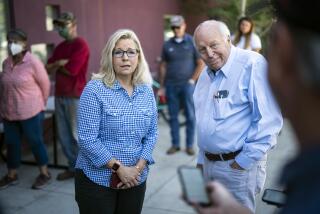Beneath Cheney’s Image, a Nice Guy
- Share via
Dick Cheney’s acceptance speech tonight at the Republican convention in New York will automatically draw the boos of a host of demonizers. They see him as secretive, wealthy, aloof.
But that doesn’t match the Cheney I know. I first encountered his signature half-smile 33 years ago at the Office of Economic Opportunity in Washington. That’s right, Cheney worked for the federal agency that fought “the war on poverty.”
Though Cheney was a pretty big deal in our little OEO world -- he was then-Director Donald Rumsfeld’s special assistant; I was congressional liaison -- he didn’t act like a big deal. He didn’t play the Washington game of glancing over your shoulder during a chat to see if anyone more important was coming within reach. Then, as now, Cheney turned being unpretentious into a fine art.
Though raised far from the seat of national political power, in Casper, Wyo., Cheney took to government. Without a power base, legacy or money, he succeeded big-time, but in roles out of the brightest spotlight. First he became White House chief of staff for Gerald Ford at the preposterously young age of 34. In those days, he’d drive his Volkswagen Beetle -- held together with duct tape -- into the executive White House lot. And when he left the White House in 1976, he asked friends to help load a U-Haul trailer so he could drive his household goods back to Wyoming.
An even better signal of the kind of man Cheney is came in the late 1980s, when he represented Wyoming in the House. A colleague from his OEO days was fatally ill. A party in the Midwest, a final goodbye, was set up. The timing was awful for Cheney, one day after the only “must attend” yearly political event in Wyoming. But the day of the party, Cheney called to ask for a ride from the airport. On the way he told me he had to hire a private plane to make it on time.
“How could you swing that on a government salary?” I asked. Dick gave that half-smile and tilted his head. “I couldn’t miss Don’s goodbye.”
That kind of loyalty has always been forthcoming. In 1983, when I walked into the Senate Caucus Room for a contentious confirmation hearing as President Reagan’s arms control director, I spotted Cheney, with his wife, Lynne, sitting in the middle of the packed room. His little wave of support made me smile, for the only time that day.
It’s true that Cheney might seem aloof, because he is congenitally quiet. Despite pleas over the years, he adamantly refused to take me fly-fishing in Wyoming. When pressed, he finally explained, “You talk too much to go fly-fishing.”
And perhaps he doesn’t help his own cause by being unable to grandstand or boast. In public life, Dick Cheney keeps a private life. We know more of John Edwards’ biography, after his four weeks in the vice presidential campaign limelight, than we do of Cheney’s, after four years in the office.
Though a politician, he resembles an academician. He prefers pressing issues to pressing the flesh. On substantive policy, Cheney can go on at length, in depth, with passion.
His congressional colleagues grasped that. They elected him chairman of their policy committee while he was in only his second House term.
In 1991, Gen. Chuck Horner, the leader of the Operation Desert Storm air offensive, was asked to brief Cheney, then Defense secretary, on the looming air war in Iraq. The general planned a standard half-hour or so briefing. Three hours later, he was still answering Cheney’s questions.
In the end, I believe it’s Cheney’s deep conservatism that draws the ire of his opponents. His positions may have surprised some Washington insiders who didn’t pay close enough attention to his voting record. They seem to have thought that no one that smart -- or that nice -- could be a real conservative.
Worse yet for his opponents, Cheney isn’t conservative on change. He’s an activist, yanking government back from its liberal bent. He’s in public service to do something, not to be someone. He practices the politics of conviction.
Which leads to his most remarkable trait. I watched Cheney being totally comfortable as a special assistant at the OEO in 1971, just as comfortable as he is being vice president in 2004. He’s not angling to be anything more.
How can that be in a place like Washington, where personal ambition is what so often fuels service, for good and ill? It’s just the kind of guy Cheney is, and that alone ought to convince the voters that his demonizers are just plain wrong.
*
Ken Adelman, a former U.N. ambassador and arms control director under President Reagan, is cohost of TechCentralStation.com, an online think tank.
More to Read
Get the L.A. Times Politics newsletter
Deeply reported insights into legislation, politics and policy from Sacramento, Washington and beyond. In your inbox three times per week.
You may occasionally receive promotional content from the Los Angeles Times.










